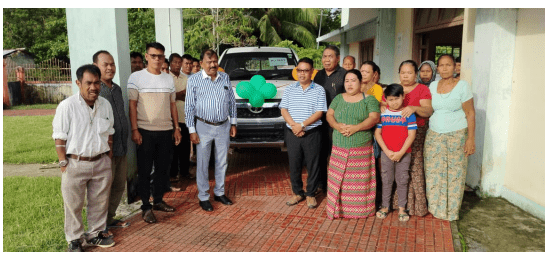A longstanding demand of tribal communities in Nicobar has been fulfilled with the District Administration handing over a mortuary van to the Sub-Tribal Council at Harminder Bay. The development follows an assurance given by the Chief Secretary during his field visit to the area in April this year, when he acknowledged the urgent need for a dedicated vehicle to transport deceased persons with dignity.
The Integrated Tribal Development Project (ITDP) under the district administration procured the van, which was formally handed over this week to the council’s secretary. For residents of Harminder Bay, the provision of a mortuary van is more than a logistical support, it marks the end of years of difficulty faced by families who struggled to arrange dignified transport for their loved ones across challenging terrain.
The administration has also confirmed that two additional mortuary vans are on their way to Katchal and Chowra. Both vehicles are currently in transit at Kamorta and will soon be delivered to the respective tribal councils. Once operational, these vans are expected to improve access to essential community services across the Nicobar District, where geographical isolation often magnifies basic needs.
For decades, the lack of a reliable means to transport deceased persons has posed social and emotional challenges for Nicobar’s tribal population. Families often relied on improvised arrangements that were both difficult and inadequate. In many cases, timely movement of the deceased was not possible, leading to further distress. By directly addressing this issue, the administration has not only honoured its commitment to tribal welfare but also eased a deeply sensitive aspect of community life.

The initiative reflects a governance approach that ties field-level feedback to tangible action. During his visit earlier this year, the Chief Secretary noted the pressing requirement for mortuary vans in far-flung tribal areas. His directive to the district officials set the process in motion, and the delivery at Harminder Bay demonstrates how administrative responsiveness can address long-standing community concerns.
Beyond Harminder Bay, the wider Nicobar region continues to face challenges in healthcare and essential service delivery due to its scattered geography and limited infrastructure. By equipping tribal councils with mortuary vans, the administration is creating a decentralized system where local institutions have the resources to support their communities directly. The councils, in turn, are expected to manage the vehicles for the benefit of residents.
By prioritising demands raised by local bodies, the administration has sought to build trust and foster a collaborative relationship with tribal communities. The focus remains on enhancing the quality of life through targeted interventions, whether in health, transport or basic civic amenities.
As the Nicobar District prepares to deliver the remaining vans to Katchal and Chowra, residents across the region will soon benefit from a facility that directly addresses a day-to-day challenge. The effort signals a responsive governance model where assurances are backed by timely action, strengthening the link between administrative promises and community outcomes.
With the delivery at Harminder Bay, the district has taken a concrete step toward bridging service gaps and recognising the needs of remote populations. For the tribal community, it is a milestone that closes a long chapter of waiting, ensuring that dignity in death becomes a guaranteed right, not a struggle.





